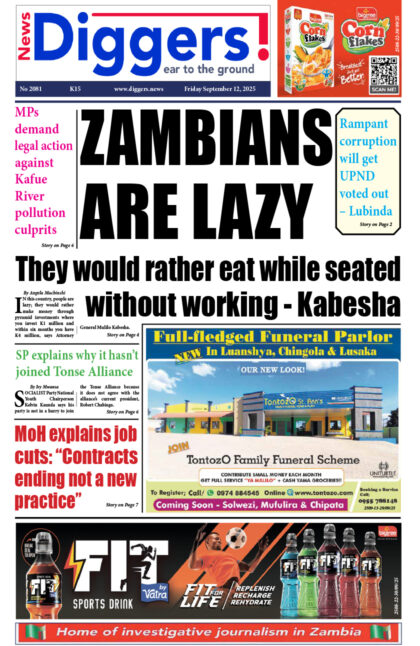FINANCE Minister Dr Situmbeko Musokotwane says government will next year abolish the payment of tuition fees, Parent Teacher Association (PTA) fees and examination fees for all secondary school pupils in public schools.
And Dr Musokotwane has announced the recruitment of 30,000 teachers and 11,200 health workers in 2022 alone.
Meanwhile, Dr Musokotwane has announced an increase on the Pay As You Earn (PAYE) exemption threshold to K4,500 from K4,000.
Dr Musokotwane also announced an increase in the Constituency Development Fund from K1.6 million to K25.7 million for each constituency.
Delivering his maiden budget speech, Friday, Dr Musokotwane announced a K173 billion budget, K100.7 billion of which is expected to be financed through revenues and grants.
Dr Musokotwane said the K72.3 billion budget deficit would be raised from external and domestic sources.
“I wish to indicate that our Treasury truly is very tight because of the excessive borrowing of the recent past. The numbers that I am about to present clearly show that the domestic revenues we shall collect are not even enough to service debt and pay public sector salaries. Madam Speaker, government proposes to spend K173.0 billion in 2022 equivalent to 37.1 percent of GDP. Of this amount, revenues and grants are K100.7 billion representing 21.6 percent of GDP. The gross financing of K72.3 billion, which translates to a budget deficit of 6.7 percent of GDP, will be raised from external and domestic sources, including a draw down on the Special Drawing Rights,” he said.
“I propose to spend a total of K86.4 billion for General Public Services translating to 49.9 percent of the total budget. Of this amount, K51.3 billion is for external debt service while K27.4 billion will go towards domestic debt service.”
Dr Musokotwane announced the abolishing of tuition fees and examination fees for early childhood and secondary school learners in the country.
“Madam Speaker, tuition, Parent Teachers Association and examination fees that learners pay in public schools will be abolished. For the avoidance of doubt, the fees charged at public early childhood and secondary schools for a child to be allowed to attend class are done away with. To this end, grants from the Government to public schools will be increased to meet the operational costs that were previously financed by the fees,” he said.
“Regarding boarding fees for secondary school learners, a bursary scheme will be introduced for vulnerable learners. The beneficiaries for bursaries will not be chosen from Lusaka or provincial headquarters and not even at the district level. Rather, it will be determined at the community level in the constituencies.”
And Dr Musokotwane announced the recruitment of 30,000 teachers and 11,200 health workers in 2022.
“Madam Speaker, for the first time in the history of this country, we will recruit 30,000 teachers in 2022. This is more than we have hired in the past ten years put together. The recruitment will help reduce the backlog of unemployed teachers. Over the next five years, the Government will continue to hire more teachers in net terms and the plan is to be current by 2026,” he told the House.
“In 2022, we will recruit and equitably deploy 11,200 health personnel. This is unprecedented. The amount we have provided for in the budget will also enable the Ministry of Health to put on payroll health staff who have been working without receiving salaries.”
Meanwhile, Dr Musokotwane announced an increase in the constituency development fund from K1.6 million to K25.7 million for each constituency.
“We have significantly increased the Constituency Development Fund or CDF to K25.7 million per constituency. Madam, the increased allocation to constituencies, especially the rural ones, is unprecedented in the history of our country. A significant amount of money is now getting into communities for them to identify their priorities, make budgets and undertake the development programs that are dear to their hearts. Madam Speaker, given this increased allocation for constituencies, we have widened the scope for utilisation of the Constituency Development Fund. This means that certain tasks that were previously under the Central Government through the district offices will no longer be performed by them. They will be undertaken by the Local Authorities working with the local communities through CDF,” the Minister said.
“In addition to the traditional community based projects, empowerment schemes that were previously funded through relevant ministries such as youth and gender will now be funded under CDF. Bursaries for secondary schools and skills development will also be administered through CDF. This will ensure equity. Under this model rural communities will also benefit unlike in the past when concentration was in the urban areas.”
The minister also announced an increase in the pay as you earn threshold to K4,500 from K4,000 in an effort to cushion the rise in the cost of living.
“In order to cushion the rise in the cost of living, I propose to increase the exempt threshold for Pay-As-You-Earn to K4,500 from K4,000 and adjust income tax bands. This means that we are putting K600 million in the hands of our employees,” he said.
Among other pronouncements, Dr Musokotwane said government would promote the manufacturing of ceramic products and proposed to suspend Corporate Income Tax for persons carrying on the business of manufacturing ceramic products for the years 2022 and 2023.
He added that to enhance tax compliance on betting, casino, lottery and gaming activities, the government would introduce a mandatory requirement for tickets to display the withholding tax payable on potential winnings, and added that this would be a condition for holding a license whether operating online or through physical stores.
The minister further stated that to support the livestock sub sector, government would remove the 5 percent customs duty on importation of cattle breeding stock and to address the shortage of day-old chicks, he proposed to suspend the 5 percent customs duty on grandparent and/or parent stock of day-old chicks when imported by a breeding company for a period of 12 months effective November 1, 2021.
He also proposed the removal of the 10 percent export duty on maize effective November 1, 2021.
And Dr Musokotwane announced that government would increase support to female headed homes under the social cash transfer.
“The Social Cash Transfer Programme will be scaled up by increasing the number of beneficiaries and the transfer value. In 2022, the number of beneficiary households under the Programme will be increased to over one million from the 880,539 as at end August 2021. In 2022, the transfer value per household will be increased from K150 to K200 per month. For households with a severely disabled member, the transfer value will be increased from K300 to K400 per month. We will improve and strengthen the payment mechanisms and oversight of the Programme,” he said.
“With regard to the Food Security Pack Programme, the number of beneficiaries will be increased to 290,000 households in 2022 from 263,700 as at end-August 2021. This Programme is targeted at the vulnerable but viable farmer households. Other social protection interventions that will be scaled up include the Girls Education and Women’s Empowerment and Livelihood Programme, the Home-Grown School Feeding Programme, Public Welfare Assistance Scheme, and Child Welfare Programmes.”
The Minister also proposed to revise upwards fees charged by the Road Transport and Safety Agency, Department of National Registration, Passport and Citizenship, Forestry Department and Seed Certification Control Institute, among others.
He further proposed to increase the Public Service Vehicles (PSV) driver’s renewal period from annual to every five years.
Dr Musokotwane stated that since Zambia remains a destination of choice for tourism, to improve its competitiveness, he proposed to reduce visa fees of all categories by 50 percent.
He added that to expand the tax base and revenue collection from the informal sector, 33 Local Authorities which signed contracts with Zambia Revenue Authority will start the implementation in 2022.
Among other proposed appropriations, the minister announced that K18.1 billion will be allocated to education while K13.9 billion has been allocated to the health sector, while K51.2 billion is allocated to external debt and 27.4 billion to domestic arrears.
























